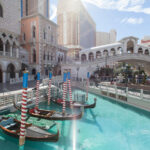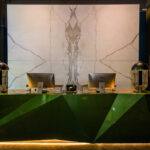
Copenhagen houses photo courtesy of Styg Nygaard.
Back in February, we told you the most important facts that you need to know about trans-Atlantic budget airlines. However, we forgot to mention one important detail: the long layover. Norwegian Airlines is an infamously cheap option for traveling to continental Europe, but unless your final destination is one of it's six hubs, be prepared for a long delay along the way in exchange for those cheap fares.
However, there's a lot to be happy about for travelers lucky enough to touchdown in Copenhagen (one of the hubs). This compact city offers gorgeous sightseeing, some of the friendliest locals on the planet, and a blissfully efficient public transit system -- all of which make a long layover in the Danish capital a breeze.
The Shortest Distance between Two Points Is the Metro:
Copenhagen’s famous “Little Mermaid” statue photo courtesy of brando.n. 
Given the Nordic reputation
for all things clean and precise, it will come as no surprise that traveling between
the airport and the city is simple, and relatively enjoyable. It’s only a 15-minute ride on the metro
to Kongens Nytorv, in the center of the city. The price of the one-way journey
is about $5.
Say "God Morgen" with Actually Danish Danishes
Pastry case photo courtesy of Photocapy.
When Americans
unthinkingly refer to their sickeningly-sweet, pre-packaged morning pastries as
Danishes, they’re committing a grave epicurean sin. Thankfully, a long layover
in Copenhagen is a fine way to atone for this wrongdoing.
Visitors to Copenhagen
are spoiled for choice when it comes to bakeries, but one of our favorites is
Reinh. Van Hauen. This storied little shop has been around for almost 140 years
and is currently operated by a father-and-son duo. The Danish pastry as we know it actually originated in Austria, where thin layers of sugar- or butter-laminated dough have been part of the viennoiserie baking tradition for centuries. By the mid-19th century, the Danes adopted the flaky, slightly crispy yet slightly chewy Danish that’s inspired a million poor imitations.
Only a five-minute walk from
the Kongens Nytorv Metro station, Reinh. Van Hauen has racks of pastries that — upon first glance — certainly look like those sad
sugar-glazed disks lining continental breakfast buffets across the world. Trust
us, though, that’s where the similarities end. To really hammer home that sugar rush, the bakery slings excellent coffee as well.
Take in Colorful Culture around Nyvahn

A quick search for information on Copenhagen is likely to come back with rows of images of colorful houses lining the city’s harbor. Those photos are of Nyvahn, and it’s every bit as photogenic as social media implies. Dating back to the 17th century, quaint sailboats dock
along the narrow canal, and the streets on either side are lined with colorful, classically Danish three- and
four-story buildings. This is to say
nothing of the sidewalk cafes up and down the canal, where a mix of locals and travelers kick back
their Tuborgs and Carlsbergs.
During its heyday, Nyvahn was known for drunken sailors and plenty of scandalous behavior. These
days it’s a far more mannered part of town, right near institutions like the
Amalienborg Palace and Royal Danish Theater. Depending on how long your
layover is, a one-hour guided canal tour might be an option. Plenty of
companies run boat tours that depart from Nyvahn, passing sights like the
famous Little Mermaid statue, commemorating the work of Hans Christian
Andersen, and Our Saviour’s Church, with its iconic corkscrew spire.
For those who prefer their culture on land, the Charlottenborg Palace sits along the canal’s
western edge. Built in 1754, it’s home to the Royal Danish
Academy of Art and the Kunsthal Charlottenborg, one of the city’s finest
contemporary art spaces. Stepping into the palace’s mossy cobblestoned
courtyard provides an immediate hush from busy Nyvahn. Inside, the juxtapositions
continue, as frequently mind-bending installations sit next to sash windows and
towering ceilings lined with crown molding. There’s also a quaint cafe and an
excellent bookstore.
Shop Your Way through Town
Laederstraede photo courtesy of Maria Eklind.
When we visit hotels, one of our favorite
design trends is Scandinavian chic — though it’s maybe not quite accurate to call it a trend, as the classic style has proved to last. This simple aesthetic is sexy, clean, and timeless — and Copenhagen happens to be one of Scandinavia’s capitals of minimalist cool. Most tourists will head to Stroget, a series of linked pedestrian avenues
that are lined with a mix of luxury and high-end retailers. Some boutiques are Danish,
but many might feel a bit too familiar to the international traveler.
For wares that are more
authentically local — and a walk that’s a bit calmer than what can be had on Stroget
— stroll Laederstraede instead. The road begins just west of Nyvahn, and this semi-pedestrianized strip is home to a
dizzying array of bespoke outlets. You’ll find everything from antiques to
locally designed clothing to sharp graphic art to stylish home-goods shops. From here, cut north around City Hall, Tivoli Gardens, and the train station to make your way for lunch in trendy Veseterbro.
Brunch or Lunch in Hipster Heaven
Bang & Jensen photo courtesy of Kieran Lynam.
Here’s the tea: Like any
good up-and-coming neighborhood, Vesterbro is equal parts shady and chic. At
the east end of the neighborhood near the train station, there are sex shops
and signs warning against hiring sex workers. At the other end are galleries,
design shops, and cafes galore. Discussions of ethics and culture aside, it
makes for a fascinating area of contrasts, and everything is — of course —
bounded by quaint little streets and charming historic buildings.
The bulk of Vesterbro’s
shops and cafes line Istedgade, a street running southwest from the train
station. Picking a lunch or brunch spot might be a little overwhelming in this foodie neighborhood,
but we love Skank. It’s exactly the charming cafe most travelers to Europe
have in mind when they arrive, with chunky wood tables, hip decor, and cheerful staff (that speaks almost perfect English — as do many
Copenhagen residents). Go for the “morgen” plates, the brunch options that are served
until late on the weekends. Available in two sizes, the dishes come as an array of
small plates including eggs, fruit, house-made breads, local cheeses, fresh
jams, and confections.
There are plenty of other
options to choose from in Vesterbro, including Kul, which fuses Danish culinary
traditions with Southeast Flavors, or old-school hipster dive Bang & Jensen. Want
something even more traditional? Opt for a smorrebrod — open-face sandwiches — at local institutions like unpretentious Cafe Dyrehaven or funky
Mad & Kaffe — both on Sonder Boulevard. For those who have even more time
to kill, check out the exhibitions at the city’s famed V1 Gallery.
Related Links:
- Eat, Pray…Eat? How I (Almost) Aced a Long Layover in (Almost) Tokyo
- How To: Ace a Long Layover in London
- 5 Views That Will Get You Tons of Likes on Instagram: Copenhagen Edition
All products are independently selected by our writers and editors. If you buy something through our links, Oyster may earn an affiliate commission.



